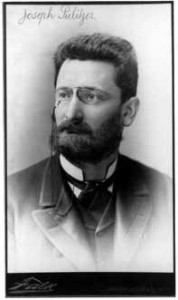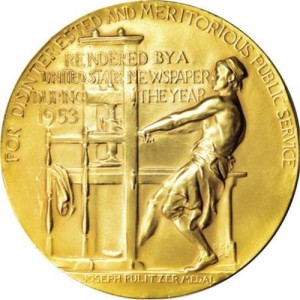The Washington Post cleaned up when the Pulitzer Prizes were announced yesterday. The newspaper won both the "public service" award and the "explanatory journalism" medal. The latter was for a series detailing the challenges faced by people on food stamps. The former was far more controversial. Shared with the Guardian, the Post won the Pulitzer for its revelation, examination, and explanation of National Security Agency documents STOLEN by Edward Snowden. (I prefer the word "stolen" to "leaked" or "disclosed.")

The Post says it had a team of 28 journalists working the story; I was happy to learn there's still a newsroom in America that has more than two dozen reporters and editors. But I'm not happy with the Pulitzer and the reflected glory it shines on Edward Snowden, that fleeing felon now protected by that great defender of liberty, Vladimir Putin.
I express my views in detail on this subject on MY OTHER BLOG, today entitled: "Pulitzer Prizes 2014: Snowden Gets the Last Laugh."
As for the Washington Post, I find some irony in a story it published a few days ago, essentially pointing out the flaws in the Pulitzer Prizes. The story was entitled "Five Myths About the Pulitzer Prize" and asserted:
1. The Pulitzers don't honor the best in American journalism. Magazines, for example, are excluded.
2. Small news outlets don't have much of a chance.
3. Some newspapers chase prizes at a "disservice to readers." Frankly, I don't agree with that. "Chasing" Pulitzer Prizes generally means spending significant resources on major projects that serve readers.

4. The Pulitzer Prizes are stuck in the 20th Century. That may have been true, but last year, the tiny on-line publication InsideClimate News won the award for national reporting for its "rigorous reports on flawed regulation of the nation’s oil pipelines, focusing on potential ecological dangers posed by diluted bitumen (or "dilbit"), a controversial form of oil."
InsideClimate News beat the other finalists, heavyweights Boston Globe and Washington Post, to win the award. (I suppose the medallion could be updated. It still shows a man hard at work on a 19th Century printing press, but isn't that part of the charm?)

The complete list of the 2014 Pulitzers, from the History award for Alan Taylor's “The Internal Enemy: Slavery and War in Virginia, 1772-1832," to Poetry, Vijay Seshadri's "3 Sections," can be found here.
Paul Levine







from Jacqueline: I read both your posts, Paul, and I agree with you - there was something really sneaky and downright wrong about the way that Snowden ran away without standing up for what he (we hope) believes in. I'm not saying that he doesn't have a point regarding the gathering of sensitive information - but revealing state secrets to the international press, and then seeking refuge under the wing of Hitler Mk 2 is just unbelievably two-faced (at the very least). Standing up for his beliefs and justifying his actions in a court of law would have been the brave and - dare I say it - honest thing to do. Daniel Ellsberg now seems to be a person of extraordinary integrity when compared to Snowden. Oh and regarding The Guardian's choice of "whistleblower" to describe Snowden - this is a favorite word in the UK press, used to describe anyone who says anything about anyone else - whether it's a teacher reporting a kid for aggressive behavior, or an MP being outed as an expenses cheat.
ReplyDeleteDoes anybody but me think Snowden looks just a little bit like Joseph Pulitzer? Add nepotism to his list of crimes.
ReplyDeleteSO anyone gets to decide what should be secret? What is the point of signing an agreement to keep your mouth shut. I'm not defending the NSA but I don't want a guy like Snowden deciding what should be a national secret and what should be made public. Same with Julian Assange, except, he did not work for the US even as a contractor. If the government was so diabolical they would both be dead, like every hack spy movie ever made.
ReplyDeletefrom Jacqueline - check out the Vanity Fair article on Snowden, in this month's edition. Just the opening paragraph of Graydon Carter's Editor's Letter makes me cringe - how the heck did that guy get the job in the first place???
ReplyDelete